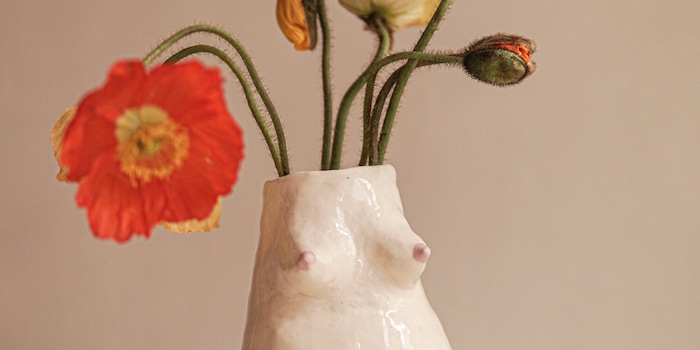
Guide
A trip to the sexologist
by Natalie Hemengül

Many things change after the birth of a child. Women in particular experience how becoming a mother can also shape or even redefine other aspects of their lives. Psychotherapist Dania Schiftan reveals the questions mums ask her the most.
I’m not a mother and maybe never will be. It’s a question I haven’t resolved for myself yet. This makes me appreciate the conversations I have with (new) mothers all the more. How do these women feel? How has their life and self-image changed? What do they enjoy, what’s challenging?
One person who deals with these issues professionally is Dania Schiftan. She’s a Zurich-based psychotherapist and clinical sexologist who provides counselling for women struggling with certain aspects of being a mother. I asked Dania, a mother of two herself, about the most common struggles mothers seek advice about from her and which solutions she offers.
«Since becoming a mother, I no longer feel desirable. How do I find pleasure in sex again and connect with my body?»
According to Dania, sexuality and motherhood is a big issue for many women on so many different levels. «Having children comes with an enormous mental, physical and emotional change. Before getting pregnant, it’s very hard to imagine how deep these changes will be,» she says.
Pregnancy alone already comes with fundamental changes, both physically and mentally. This doesn’t simply end with the birth of the child. «Many women report that their bodies feel different, that being touched can be painful or simply feel strange. In addition, many women think they’re less attractive and less desirable than before.» This distorted self-image has a massive impact on a woman’s desire for sex.
In addition, the need for physical touch is often more than satisfied when you have a baby. «Many women struggle with their partner’s physical touch, as it can feel like too much on top of constant closeness to the baby.» Then there’s sleep deprivation, a conflict of roles, occasionally also disappointments in the relationship and seeing your partner in their new role as a parent. All of this can make it even more difficult to tap into your sexuality, Dania explains.
«The key is to avoid recreating sexuality as it was before, but to fully rediscover it. It’s about finding out what pleasure and desire mean to you right now – detached from any expectations.»
«All we talk about is the children. How do we reconnect as a couple instead of just being on autopilot as parents?»
The birth of a child is like an earthquake in the vast majority of relationships, says Dania. «It’s a huge change couples are usually underprepared for. There’s rarely any real talk before the baby arrives about who will do what and how this will work on a daily basis. Most couples just trust that it will work itself out.» But when the child arrives, the parents are overwhelmed.
In this overwhelm, outdated, socially learned patterns often take hold, she explains. The mother automatically takes on the household and children, the father the role of breadwinner. «In many cases, however, mothers also work, which adds to the pressure. Especially in the first months or years with a baby, couples are in a state where they’re simply functioning and just trying to keep afloat.»
This phase often results in disconnection between the parents. Instead, the relationship fades into the background. The «you and me» is, at best, replaced by a feeling of being part of a family team. «It’s crucial that couples learn to nurture their relationship too. This requires time, energy and space. Moments dedicated to each other, sharing experiences and creating a sense of closeness beyond the role of being a parent.»

«I feel like my only role is being a mum. How do I rediscover who I am as a woman?»
«Self-image is closely linked to the changes around pregnancy and motherhood,» says Dania. The female body undergoes huge changes during this time – often in ways that are in stark contrast to our social ideals. «Many women feel less attractive, less interesting, ‘too fat, too thin, too bloated, too flat’.» Something’s always too much or not enough.
Constantly feeling inadequate has women feeling alienated in their own bodies, doubting themselves or making enormous efforts to «get back to the way they were before». Be it to pre-pregnancy or even adolescence. «We often lose sight of the incredible beauty a body can develop by becoming a mother.»
Instead of remaining trapped battling your own body, the key is to move towards adapting. This means learning to inhabit your new body, to feel at home in it and to view the changes not as flaws, but as an expression of strength and achievement. «This body has achieved something amazing – it’s created a human being. This is precisely where the dignity and beauty lie that needs to be discovered.»
«I don’t know if I want to go back to my old job or start something completely new. How do I find out what I really want?»
Many women tend to realise after their child’s been born that their job no longer has the meaning it did before, says Dania. «The validation, appreciation and self-worth that previously came from a career, success and social recognition, start taking a back seat. This sometimes goes hand in hand with a surprising desire to stay at home with the child.» For many, this comes as a shock.
But there are also women who continue enjoying their careers, are passionate about their work and find fulfilment in it. However, this doesn’t mean there’s guilt. It’s a feeling that might come from the mother herself or be fuelled by people around her. «Add to that a general overwhelm. Think a lack of support in daily life, an unclear division of tasks and the feeling of not being able to do justice to the child or the job.» This creates frustration, inner turmoil and often a strong feeling of inadequacy.
For some, however, motherhood also triggers a profound change. «New ideas, creativity and professional visions emerge. But these are often difficult to put into action because of the responsibilities and commitments.»
That’s why it’s crucial in therapy to ditch concepts of right or wrong and to avoid being guided by social images. Instead, it should be about finding out together with the therapist what your innermost desire is, irrespective of any expectations and norms.
«I’ve hardly any time left for myself or my interests. How can I make time for myself without constantly feeling bad about it?»
A particularly large stumbling block for many mothers is the finding time for themselves. After all, it’s in short supply. What’s more, mums often feel they’re always one step behind, trying to catch up. «Many women were also raised to believe leisure time and hobbies are superfluous. Things that don’t generate value or money.» This often results in frustration creeping in. Over time, this can lead to sadness and feeling out of balance.
This is precisely why it’s so important to make time for yourself. «It’s only with some distance from your family that you can feel you exist as an independent person with your own needs, interests and joys.» This experience is key to bringing energy and vitality back into the family.
According to Dania, the way to get there is often to ask yourself: what did I used to enjoy? What still inspires me today? «Even if it seems like there’s zero time available, there usually still is. It’s just a matter of prioritising.» These priorities need to be reset in order to create a balanced and fulfilling life.
You can find all the other articles in this series here:
As a massive Disney fan, I see the world through rose-tinted glasses. I worship series from the 90s and consider mermaids a religion. When I’m not dancing in glitter rain, I’m either hanging out at pyjama parties or sitting at my make-up table. P.S. I love you, bacon, garlic and onions.
Interesting facts about products, behind-the-scenes looks at manufacturers and deep-dives on interesting people.
Show all
Background information
by Ann-Kathrin Schäfer

Background information
by Michael Restin

Background information
by Ann-Kathrin Schäfer